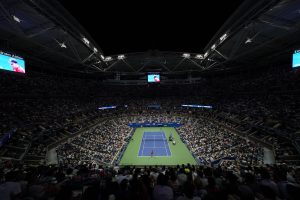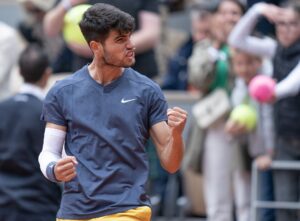Rafael Nadal progressed to his 116th tour-level final as he defeated Karen Khachanov in straight sets 7-6(3) 6-4, and will now play the 20-year-old rising star Stefanos Tsitsipas in the Rogers Cup final on Sunday.
The common theme for the week for Nadal has been not about how he starts tennis matches, but how he finishes them. The Spaniard came through an up-and-down Benoit Paire, before rallying away to secure the victory in straight sets, but he played better sets of tennis towards the end of two big matches against Stan Wawrinka in the 3rd round and Marin Cilic in the quarter-final.
In those matches we have seen Nadal have problems with his serve and with the confidence behind the forehand side, but he continued to rally away, continued to persevere, and dug deep in all of those wins in his usual way to secure some dramatic finishes. That similar pattern occurred once again against Russia’s Karen Khachanov in today’s semi-final. The rising star caused Nadal a few problems to begin with and it took quite some time for Nadal to really wrestle control of the match, but once the Russian started to commit a few unwanted unforced errors off the forehand side, Nadal was the ultimate opportunist and really kicked on from there. The forehand down the line started finding its mark, the placement on serve continued to be varied to prevent Khachanov from getting any real rhythm and he even dropped the pace in his groundstrokes to prevent his opponent from feeding off the pace of the ball.
In three of the four matches that Nadal has played this week he has played positive final sets, but he will need to be fully on his game if he is to get his fourth title in Canada as he looks to halt the momentum of confident Greek star Tsitsipas in tomorrow’s final.
Tsitsipas has had a wonderful week. Again, like Nadal, he has not played his best tennis in each and every match, but the significant thing about this players rise to the Top-20 this year is his maturity and composure under pressure and that is something he will take with him into his older years on tour. With his win over Kevin Anderson in the semi-final, it marked the first time in four years that a player has beaten four Top-10 players inside one tournament. Tsitsipas achieved that feat by beating Anderson, Dominic Thiem, Novak Djokovic and defending champion Alexander Zverev en route to the final.
The interesting sub plot is simply how will the Greek man react from a physical standpoint when he approaches this match. In his big run to a first ATP final in Barcelona back in April, Tsitsipas was magical all week, but the grind of the week really caught up on him and the tournament culminated with Rafael Nadal winning the Barcelona title with the loss of just three games.
We’ve also seen after a big week in Washington last week, where Tsitsipas made the semifinals, that the Greek star really struggled to recover after a huge quarterfinal effort the day before, so there are a few key areas to his game that will get better as he improves into more of a physical specimen.
Aside from the physical side, the biggest duel of all is the Nadal forehand cross-court shot into Tsitsipas’ backhand side. Over the years we have seen Nadal dominate Roger Federer on the clay because of the heavy top spin going from the forehand jumping up to the one-handed backhand of Federer. The Greek man has a fabulous one-handed backhand, but the problem for the 20-year-old is that his game really fits the perfect patterns of play that Nadal likes to find on a tennis court. He likes to stay in the cross-court patterns and wait for his opportunity to go into the open court and he likes to prey on the vulnerabilities that a one-handed backhand presents.
The positive thing for Tsitsipas is that there is a way around it. We saw in Nadal’s third round match to Stan Wawrinka, who also possesses one of the most aggressive, fearless one-handed backhands on tour, that it is possible to cause Nadal problems if you play with reckless abandon and really try to take time away and beat the bounce of the ball. The risk is high in pulling it off, but the risk has to be high in order to topple someone like Nadal on most surfaces. I think the mindset that Tsitsipas has to really put through is to have a great serving day, which he is capable of, but also step in and give Nadal something to really ponder and think about in the early stages of the match.
I think Nadal will win. The great thing about his week is that he has been at his problem-solving best. He likes to navigate his way through matches and he likes to stand up to adversity in tennis matches, which is what has made him the player he is today. I just think that Nadal’s physicality and aura are two things that will give him the edge in this one. Yes, Tsitsipas has not really showed much anxiety in playing the big players, but that drubbing in the Barcelona final surely is something that he remembers clearly and not too fondly.
Nadal is chasing a first hard-court Masters 1000 title since Cincinnati in 2013, and I think he will claim his fourth Rogers Cup title on Sunday.
Main Photo:
Embed from Getty Images






